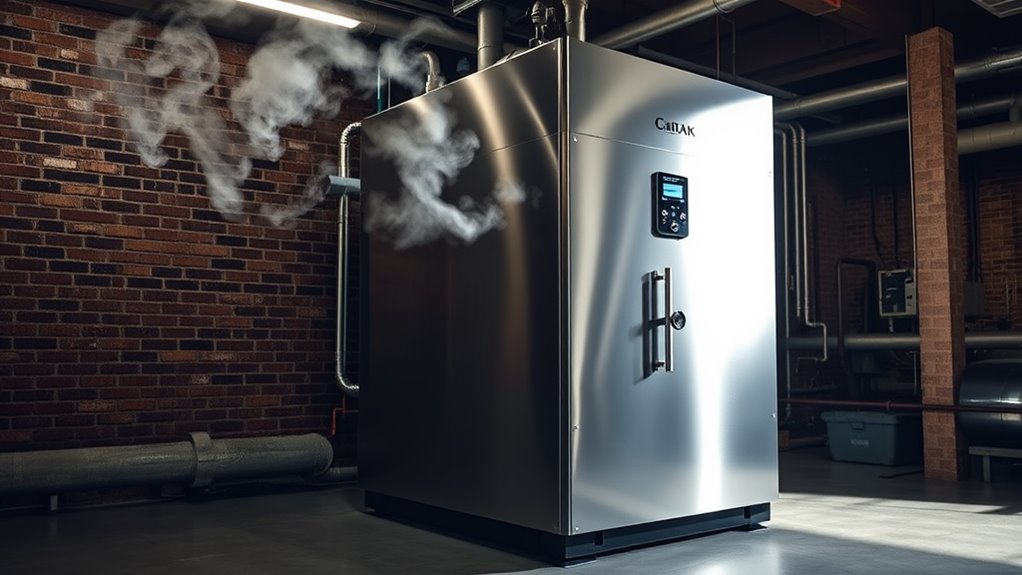A commercial boiler typically lasts between 10 to 30 years, depending on its type and maintenance practices. Gas boilers generally endure 15 to 30 years, while oil boilers can last up to 30 years. Electric boilers usually function for 10 to 25 years, and commercial heat pumps can reach about 20 years. Factors like material quality and regular maintenance play a vital role in longevity. Understanding these details can lead to informed decisions about your boiler's performance and efficiency.
Key insights
- Gas boilers typically last between 15 to 30 years, while oil boilers can endure 25 to 30 years.
- Electric boilers generally have a lifespan of 10 to 25 years, and commercial heat pumps last up to 20 years.
- Longevity is influenced by factors like usage patterns, maintenance practices, and the quality of materials.
- Regular maintenance and inspections can significantly extend a boiler's operational life and efficiency.
- Environmental conditions, such as humidity and temperature fluctuations, also affect the durability of commercial boilers.
Understanding Commercial Boilers
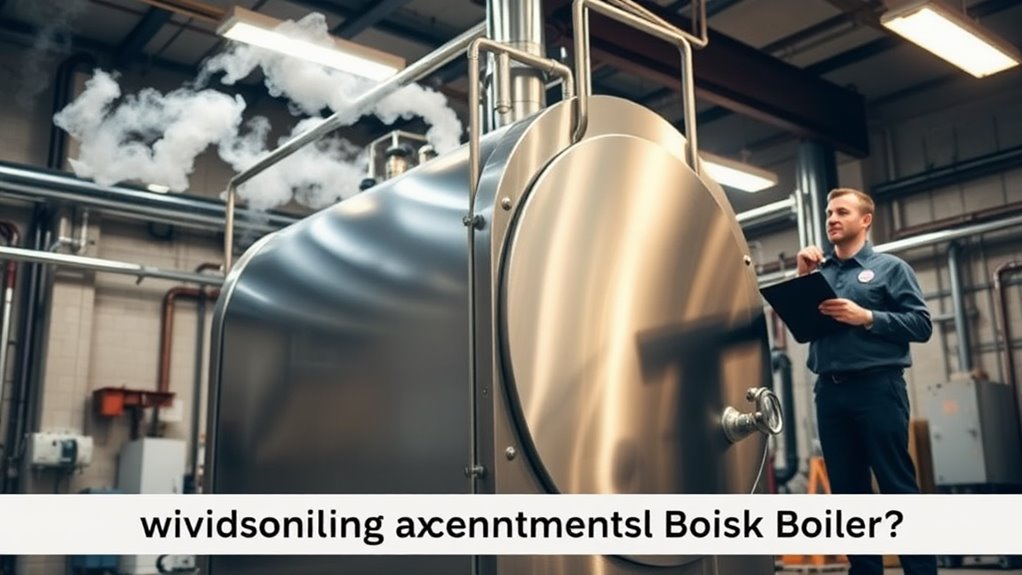
When you explore understanding commercial boilers, it's essential to recognize their role in various industrial and commercial settings. These systems are designed for maximum boiler efficiency, which directly impacts operational costs and energy consumption. You should assess the heating capacity of a boiler, as it determines the volume of water it can heat and the rate at which it can deliver hot water or steam. A boiler's efficiency is typically measured by its Annual Fuel Utilization Efficiency (AFUE) rating, reflecting how effectively it converts fuel into usable energy. Understanding these parameters enables you to select the right boiler for specific applications, ensuring that it meets your heating demands while maintaining energy efficiency and reducing environmental impacts. Regular commercial boiler service is crucial to prolonging its lifespan and ensuring optimal performance.
Average Lifespan of Different Boiler Types
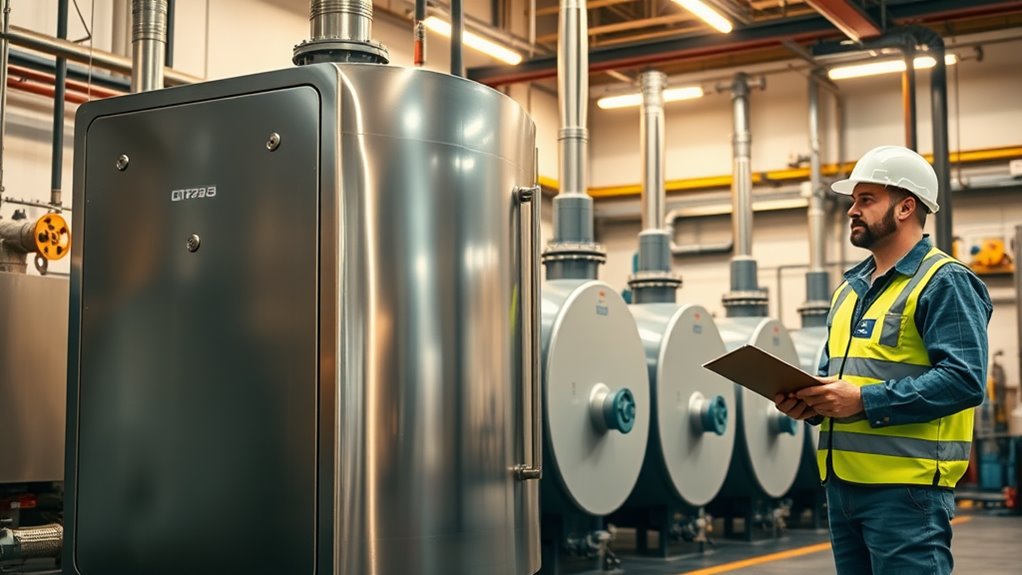
When evaluating the average lifespan of different boiler types, you'll find notable variations. Gas boilers generally last around 15 to 20 years, while oil boilers can endure up to 25 years with proper maintenance. In contrast, electric boilers often have a longevity of 10 to 15 years, influenced by usage and maintenance practices. Additionally, commercial heat pumps can have a long lifespan of up to 20 years, offering an alternative heating solution for businesses.
Gas Boilers Lifespan
Gas boilers typically last between 15 to 30 years, depending on factors like maintenance, usage, and installation quality. To maximize your gas boiler's lifespan, focus on regular gas boiler maintenance, which includes inspections, cleanings, and timely repairs. Neglecting these practices can lead to decreased gas boiler efficiency and higher operating costs. The quality of installation also plays a critical role; proper sizing and adherence to manufacturer specifications can greatly enhance longevity. Additionally, the boiler's operational environment, including factors like water quality and pressure, influences its durability. By prioritizing these aspects, you can guarantee your gas boiler remains efficient and reliable throughout its expected lifespan. Furthermore, ensuring compliance with safety regulations can prevent hazards and extend the life of your heating system.
Oil Boilers Durability
Oil boilers generally have a lifespan ranging from 20 to 30 years, making them a durable option for heating needs. To maximize this longevity, you should focus on key aspects of oil boiler maintenance and efficiency:
- Regular Servicing: Schedule annual inspections to guarantee all components function properly, preventing potential issues.
- Fuel Quality: Use high-quality oil to improve combustion efficiency, reducing wear on the system.
- Filter Changes: Replace filters regularly to maintain peak oil boiler efficiency and prevent blockages.
Additionally, implementing a preventative maintenance plan can help address specific equipment needs and extend the overall lifespan of the boiler.
Electric Boilers Longevity
Although electric boilers are often praised for their efficiency and low maintenance requirements, their typical lifespan ranges from 15 to 25 years. Factors influencing this longevity include usage patterns, water quality, and overall system design. High electric boiler efficiency contributes to reduced wear and tear, enhancing durability when properly maintained. Regular electric boiler maintenance—like checking electrical connections, inspecting heating elements, and monitoring pressure levels—ensures peak operation and can extend the unit's life. Neglecting maintenance can lead to premature failure, which emphasizes the importance of routine service checks. By understanding these dynamics, you can maximize your electric boiler's lifespan and maintain its efficiency, ultimately saving on long-term operational costs. Additionally, ensuring compliance with Commercial Gas Safety Certificates is vital for safety and legal adherence in businesses using gas appliances.
Factors Influencing Boiler Longevity
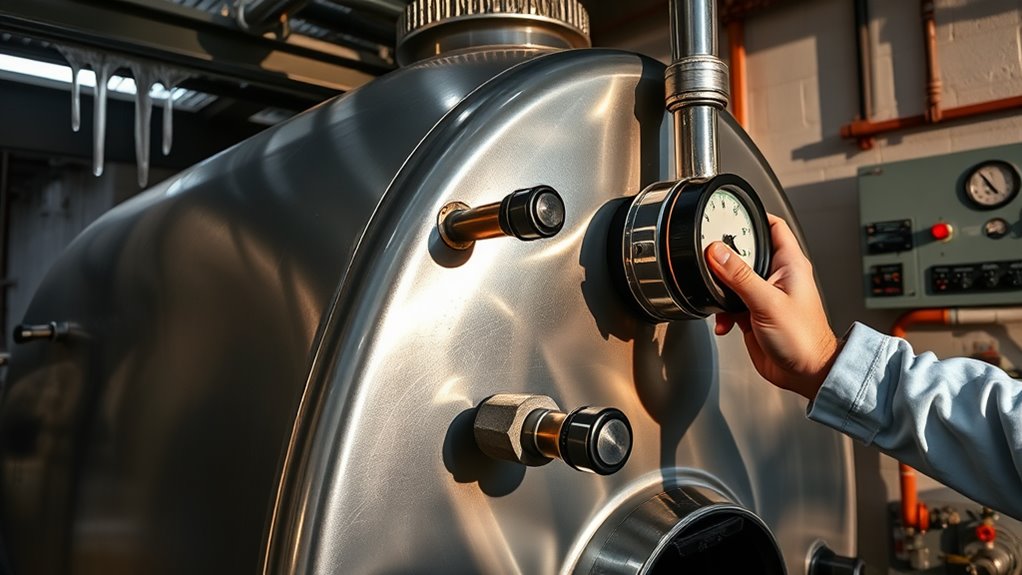
When considering the longevity of a commercial boiler, several critical factors come into play that directly impact its operational lifespan. Understanding these elements can help you maintain efficiency and reliability. Here are three key factors:
- Boiler Materials: The quality of materials used in the construction of your boiler affects durability. Higher-grade materials resist corrosion and wear better over time.
- Maintenance Practices: Regular maintenance, including inspections and cleaning, is essential for preventing issues that could shorten your boiler's life.
- Environmental Impact: Operating conditions and the surrounding environment can lead to increased wear. Factors like humidity, temperature fluctuations, and air quality should be considered. Additionally, adherence to local building regulations during installation can enhance the overall lifespan of the boiler.
Signs Your Boiler May Need Replacement
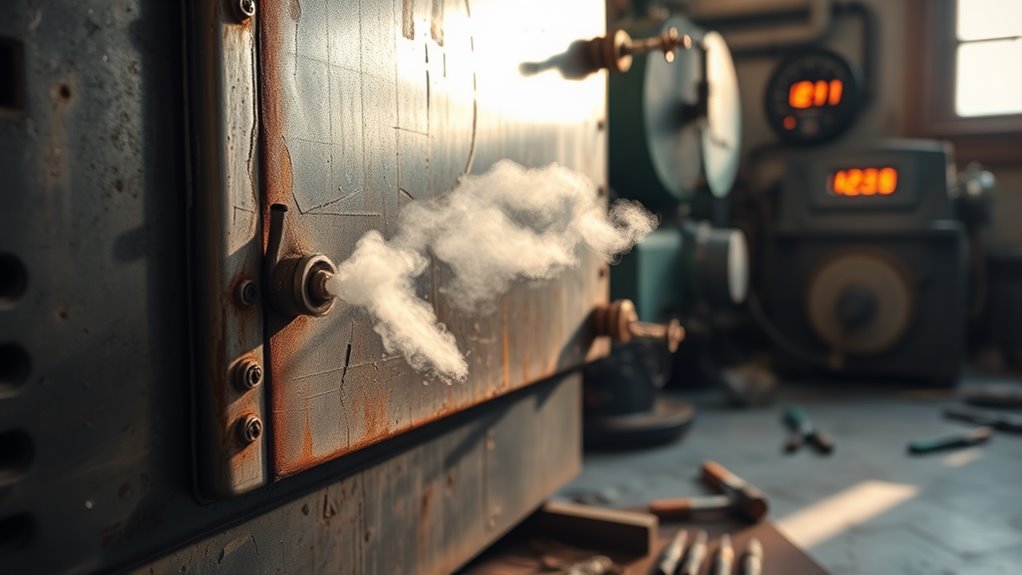
How can you tell if your commercial boiler is nearing the end of its useful life? Look for specific boiler warning signs that indicate a need for replacement. Frequent breakdowns and costly repairs are primary replacement indicators; if you find yourself calling for service repeatedly, it's a red flag. Additionally, if you notice rising energy bills without changes in usage, your boiler may be losing efficiency. Unusual noises, like banging or hissing, can also signal internal issues that could warrant replacement. Finally, check for leaks or corrosion around the unit; these physical signs often indicate that your boiler's integrity is compromised. Recognizing these indicators early can save you from unexpected downtime and expenses. Regular maintenance checks can also help identify potential issues before they escalate.
Maintenance Tips for Extending Boiler Life
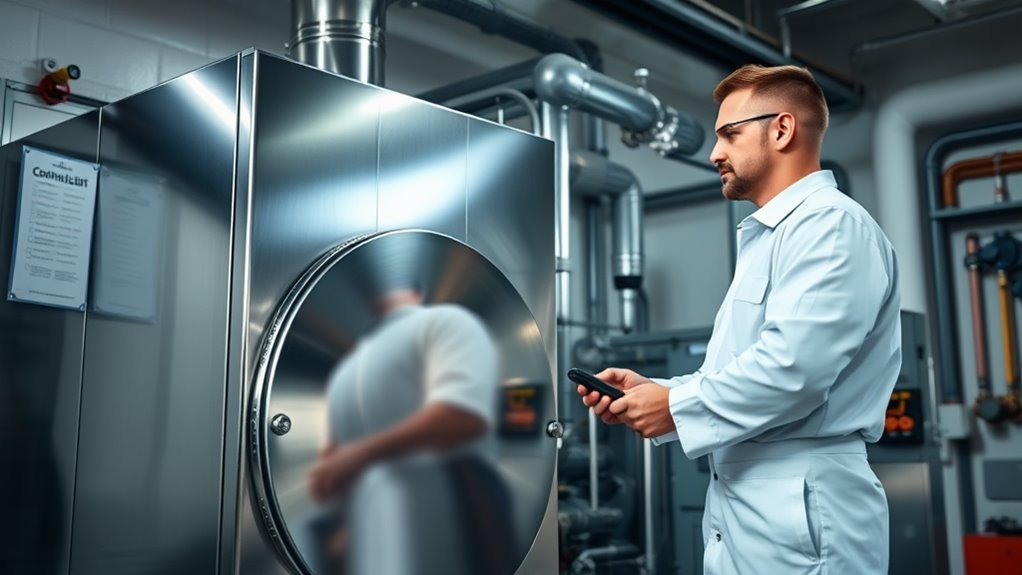
To extend your boiler's lifespan, regular inspections are essential for identifying potential issues before they escalate. Implementing efficient operating practices also plays a vital role in maintaining ideal performance and reducing wear. Additionally, incorporating commercial power flush services can significantly improve heating system efficiency and prolong equipment lifespan. By focusing on these key maintenance strategies, you can enhance the reliability and longevity of your boiler system.
Regular Inspections Required
Regular inspections are essential for maintaining the efficiency and longevity of commercial boilers, as they help identify potential issues before they escalate into costly repairs. To guarantee peak performance, follow this maintenance checklist:
- Establish inspection frequency: Schedule inspections at least twice a year or as recommended by the manufacturer.
- Conduct thorough checks: Examine components such as burners, heat exchangers, and safety controls for wear or malfunction.
- Document findings: Keep a detailed log of inspection results and maintenance activities to track performance trends and address recurring issues. Additionally, ensure that you are familiar with error codes to quickly identify any faults that may arise during operation.
Efficient Operating Practices
Implementing efficient operating practices can considerably extend the lifespan of your commercial boiler. To achieve peak energy efficiency, regularly monitor system pressure and temperature settings, verifying they're aligned with manufacturer specifications. Adjusting the combustion process can also enhance performance; verify air-to-fuel ratios are correct to minimize excess emissions.
Additionally, maintain clean water quality to prevent scale buildup and corrosion, both of which can impair efficiency. Scheduling regular maintenance checks allows for early identification of potential issues, verifying operational practices remain effective. Regularly monitoring the boiler's pressure gauge can help prevent errors like the E119 code, ensuring optimal performance.
Educate your staff on proper boiler operation to prevent misuse that could lead to premature wear. By adhering to these operational practices, you not only prolong your boiler's life but also improve overall energy efficiency and reduce operational costs.
Cost Considerations for Boiler Replacement
When evaluating the replacement of a commercial boiler, it is essential to assess the associated costs meticulously. A thorough cost analysis will help you make informed decisions during budget planning. Here are three key factors to take into account:
- Initial Purchase Price: Investigate various models and their efficiency ratings, as higher upfront costs may lead to long-term savings.
- Installation Costs: Factor in labor and any necessary modifications to your existing infrastructure, which can vary greatly.
- Operational Expenses: Assess fuel consumption, maintenance, and potential downtime, as these will impact your overall financial commitment.
Frequently Asked Questions
Can a Boiler Be Repaired Instead of Replaced?
Yes, a boiler can often be repaired instead of replaced, depending on the issue. You should evaluate the boiler repair options available to you, considering factors like the severity of the problem and the age of the unit. Repairing may be more cost-effective, especially for minor issues, but if frequent breakdowns occur, replacement could ultimately save you money in the long run. Always consult with a qualified technician to assess your specific situation.
What Are the Environmental Impacts of Old Boilers?
Old boilers often produce higher boiler emissions, contributing to air pollution and greenhouse gas effects. You might notice they operate with lower energy efficiency, leading to increased fuel consumption. This inefficiency not only raises operational costs but also exacerbates environmental harm. Upgrading to modern systems can considerably reduce emissions and enhance energy efficiency, aligning with sustainability goals. Making this change is essential for minimizing your environmental footprint and improving overall system performance.
How Often Should Boiler Inspections Occur?
You should schedule boiler inspections at least once a year to guarantee peak performance and safety. Regular boiler maintenance is essential for identifying potential issues before they escalate. Depending on the usage and specific conditions, you might need to adjust the inspection frequency. For high-demand systems, semi-annual inspections may be necessary. Keeping up with these inspections not only extends the life of your boiler but also enhances energy efficiency and reduces environmental impact.
Are There Warranties for Commercial Boilers?
Yes, there are boiler warranties available for commercial boilers. These warranties typically provide coverage for parts and sometimes labor, protecting your investment against manufacturing defects. Warranty coverage can vary greatly between manufacturers, so it's essential to review the specific terms and conditions. Generally, you'll find warranties lasting anywhere from one to several years, ensuring that you're supported in case of unexpected issues during that period. Always consult your supplier for detailed warranty options.
What Are the Most Reliable Brands of Commercial Boilers?
When evaluating the most reliable brands of commercial boilers, consider factors like boiler efficiency and brand comparison. Brands like Buderus, Bosch, and Viessmann consistently rank high due to their advanced technology and durability. You'll find that these manufacturers prioritize energy efficiency, which can greatly reduce operational costs. Always compare warranties and customer reviews to make an informed decision, ensuring you choose a brand that meets your specific needs and performance expectations.
Summary
In summary, understanding the lifespan of your commercial boiler is vital for effective planning and budgeting. By recognizing the average longevity of different types and monitoring key factors influencing performance, you can make informed decisions. If you notice warning signs, don't hesitate to evaluate your options. Regular maintenance is important for extending your boiler's life, and weighing cost considerations can help you avoid unexpected expenses. Prioritize these aspects to guarantee efficient and reliable operation for years to come.

